SERMONS IN CANDLES:
BYC. H. SPURGEON.
Lecture 2

I AM afraid the science of emblems does not flourish so well among us as it did in a former age, when it constituted an important branch of learning.
 You might find a rare field of recreative study in Emblem literature. So many have tried it that certain of the older emblem-books have become too expensive for the ordinary reader to purchase. There has been a run upon them, and this has raised the price beyond their intrinsic value.
You might find a rare field of recreative study in Emblem literature. So many have tried it that certain of the older emblem-books have become too expensive for the ordinary reader to purchase. There has been a run upon them, and this has raised the price beyond their intrinsic value.
In almost every collection of emblems, I have found the candle, and perhaps most frequently of all, the candle and the fly. I am not cruel enough to wish to give you an actual example of the way in which flies, moths, and other insects are glamoured with the glare of a candle; but I may give you the facsimile of an old cut from Giles Corrozet's Hecatomgraphie,
 a French work, dated 1540. Under the motto, "War is sweet only to the inexperienced", he gives, in illustration, a number of moths or butterflies fluttering toward a candle: said candle and moths being of gigantic size if compared with the room. Attached to the wood-cuts are verses which signify that those alone seek the battle-field who know not its great dangers. This reminds me that the good Earl of Shaftesbury told me that when he was Lord Ashley, he once rode with the Duke of Wellington through the lovely villages off Berkshire, and for half-an-hour the warrior was silent. When at length he spoke, he said, "I dare say you wonder what has made me so quiet. I was thinking of the havoc which war would make of all this peace and beauty. If war should ever come here, it might be my duty to burn and destroy all these happy homes. Whether there follow upon it defeat or victory, war is a great calamity." The great soldier spoke the truth. May those nations which delight in war rest content with former burnings of their wings, and let the flame alone.
a French work, dated 1540. Under the motto, "War is sweet only to the inexperienced", he gives, in illustration, a number of moths or butterflies fluttering toward a candle: said candle and moths being of gigantic size if compared with the room. Attached to the wood-cuts are verses which signify that those alone seek the battle-field who know not its great dangers. This reminds me that the good Earl of Shaftesbury told me that when he was Lord Ashley, he once rode with the Duke of Wellington through the lovely villages off Berkshire, and for half-an-hour the warrior was silent. When at length he spoke, he said, "I dare say you wonder what has made me so quiet. I was thinking of the havoc which war would make of all this peace and beauty. If war should ever come here, it might be my duty to burn and destroy all these happy homes. Whether there follow upon it defeat or victory, war is a great calamity." The great soldier spoke the truth. May those nations which delight in war rest content with former burnings of their wings, and let the flame alone.
Others have used the same emblem as a warning against the indulgence of sinful passions. The motto is, Brevis et damnosa voluptas "short but ruinous pleasure." "For one pleasure a thousand pains." The sin promised to enlighten the eyes, but it burned into the very soul. Full often when we hear of young people ruined by unbridled appetites, we are apt to say with the world's great poet:--
Error has the same effect on certain restless minds. No sooner is a new theory started, than they make a dash for it; and though it. costs them comfort, fellowship, and holiness, they fly at it again. "0 foolish Galatians, who hath bewitched you ?" The fascination of novelty appears to be irresistible, when minds are weak and conceited.
Here is a picture of a candle. In artistic circles the drawing of an object may cost far more than the object itself. Did not the Shah of Persia once ask the price of the painting of a donkey, and, when he heard the amazing demand,
 he calculated how many real asses could have been purchased with the money. No doubt a well-painted picture of a candle would cost as much as would light us for many a month, and yet it would never yield to our necessity a single beam of light. So, the resemblance of true godliness costs a man far more care and trouble than the genuine article would involve, and yet it is nothing after all. One cannot light himself to bed by the picture of a candle, neither can he find comfort in the hour of death by the imitation of religion. There must be reality, and that reality involves flame and light: in our case a flame and light which none but God can give. If there be nothing of heavenly fire and spiritual truth about our piety, our profession is vain. The great distinction between living grace and its imitation can be seen by all spiritual minds. 'We are overdone with portraits, but men are by no means plentiful. We have as many paintings of candles as the church-walls will hold; but we have few real lamps, or else this world would not remain so dark as it now is. Those candles which are not consumed by their own flame are giving no light, and those persons who are themselves unaffected in heart and life by their religion. may fear that they are mocking themselves with the mere appearance of sacred things. You may sit a long time in front of a painted fire before you will be warmed, and you may long maintain formal religion, and yet never derive comfort from it. To look for a lost ring in a dark cellar by the help of the picture of a candle, is not more unreasonable than to look for rest of heart in a godliness which is a mere pretence.
he calculated how many real asses could have been purchased with the money. No doubt a well-painted picture of a candle would cost as much as would light us for many a month, and yet it would never yield to our necessity a single beam of light. So, the resemblance of true godliness costs a man far more care and trouble than the genuine article would involve, and yet it is nothing after all. One cannot light himself to bed by the picture of a candle, neither can he find comfort in the hour of death by the imitation of religion. There must be reality, and that reality involves flame and light: in our case a flame and light which none but God can give. If there be nothing of heavenly fire and spiritual truth about our piety, our profession is vain. The great distinction between living grace and its imitation can be seen by all spiritual minds. 'We are overdone with portraits, but men are by no means plentiful. We have as many paintings of candles as the church-walls will hold; but we have few real lamps, or else this world would not remain so dark as it now is. Those candles which are not consumed by their own flame are giving no light, and those persons who are themselves unaffected in heart and life by their religion. may fear that they are mocking themselves with the mere appearance of sacred things. You may sit a long time in front of a painted fire before you will be warmed, and you may long maintain formal religion, and yet never derive comfort from it. To look for a lost ring in a dark cellar by the help of the picture of a candle, is not more unreasonable than to look for rest of heart in a godliness which is a mere pretence.
Our third emblem is not a candle, but a case for candles, a casket for those jewels of light. Look well at this curiosity, ye dwellers in cities; for I do not suppose that any of you have such a piece of furniture in your houses.
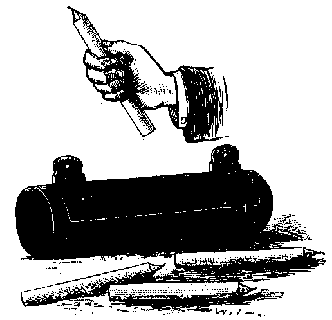 It is a candle box, well-fashioned and neatly japanned. Here at the back are two plates with holes in them by which to hang up the box against the wall. It closes very neatly, opens very readily, and keeps its contents out of harm's way. I can assure you that I have within it a number of the very best candles, from the most notable makers. Wax, stearine, palmatine, and so forth: there could not be a handsomer assortment than I now exhibit to you. Let no one despise this display: here we have capacity, elegance, preparation, and plenty of each. But suppose that we were in this room without the gas, and I were simply to exhibit the candle-box and its contents, and say, "Here is brilliance! You need no electric lighting: this box abundantly suffices for the enlightenment of this large assembly!" You would reply, "But we see none the better for your boasted illumination. The candles are shut up in their box, and yield no single beam of light." herein detect a resemblance to many a church. We could readily find communities of Christian people, who are shut up to themselves, and are without the living fire of the Spirit of God. What is the good of them?
It is a candle box, well-fashioned and neatly japanned. Here at the back are two plates with holes in them by which to hang up the box against the wall. It closes very neatly, opens very readily, and keeps its contents out of harm's way. I can assure you that I have within it a number of the very best candles, from the most notable makers. Wax, stearine, palmatine, and so forth: there could not be a handsomer assortment than I now exhibit to you. Let no one despise this display: here we have capacity, elegance, preparation, and plenty of each. But suppose that we were in this room without the gas, and I were simply to exhibit the candle-box and its contents, and say, "Here is brilliance! You need no electric lighting: this box abundantly suffices for the enlightenment of this large assembly!" You would reply, "But we see none the better for your boasted illumination. The candles are shut up in their box, and yield no single beam of light." herein detect a resemblance to many a church. We could readily find communities of Christian people, who are shut up to themselves, and are without the living fire of the Spirit of God. What is the good of them?
This is a very respectable candle-box; is it not? It could hardly be more respectable. Even so, yonder is a highly respectable congregation! Very refined and select! The minister is a "man of high culture and advanced thought." He can confound a text of Scripture with any living man. He attracted at least five horses to his place of preaching last Sunday. They say it takes a great deal of ability to draw a horse to church! As for his hearers, they are all the cream of the cream. Don't you know that the doctor, and the brewer, and the lawyer, and the auctioneer all attend that most honoured sanctuary? What with an M.D., and a D.D., and an F.R.S., two wealthy dowagers, a Colonel, a County- Council-man, and a Professor, it is worth while for a fellow to go to that chapel -- I beg pardon -- church, for the sake of the social distinction which it will bestow upon him. The people are so very respectable that they do not. know one another, and never think of shaking hands. They are all so very select, that they float about in distinguished isolation, like so many icebergs in the Atlantic. The families walk up the aisles with the most becoming dignity, and they walk down the aisles with the most proper decorum. They can do without warmth, brotherly love, sympathy, and co-operation; for their eminent "respectability" suffices for every need. Of course, they can do nothing more; for it costs them all their time, talent, thought, and spare cash to maintain their superior respectability. Like the gentleman with his well-brushed hat, no wonder that they look so superior, for they give their whole minds to it.
One asked a member of a certain respectable church whether he taught in a Ragged School, and weally he could hardly answer the fellow. The superior person champed the word "Ragged School" as a donkey might a roll of oakum. Another, a portly deacon, was asked whether he would join in holding an open-air service; but he looked the intruder through and through as if he would like to open him. None of the ladies and gentlemen help the Temperance work, for they are too respectable to go in with vulgar water-drinkers; neither do they visit the lodging-houses, for that would be too disreputable for their royal highnesses. All these make up an eminently respectable community; but why they are respected, this deponent sayeth not.
Here, take away this candle-box! I want no more of it or its contents, for it gives no jot of light! That is what will happen to very respectable churches which do no work for God or man: they will be put away, and even their candlestick will be taken out of its place. If they do not mend their ways, not a few of our dissenting churches will die out, and leave nothing behind them but a name to laugh at. A church which does nothing for those around it, mocks the need of men, leaves the world in darkness, and grieves the Lord who designed his people to be the lights of the world.
As in a community, so with a single person; grace is essential to usefulness. All the candles in that box remain useless till the wick is lighted with a touch of fire;
 and this lone candle is equally so. See, I bring another candle in contact with it. They are tete-a-tete, or wick-a-wick, but the first has no influence upon the second. A thousand such interviews will produce no result. If there were a living flame here, you could soon set not only this one candle shining, but as many as you chose to bring; but without it nothing can be done. No man can communicate what he has not got: you cannot hope to save your fellow-man till you know the salvation of God for yourself. To be a preacher or teacher before one has received the divine life is as foolish as for a candle "to set up for a lighter of others before it has been lighted itself. How different the result when the living flame is there! See how the one sets the other on a blaze at once!
and this lone candle is equally so. See, I bring another candle in contact with it. They are tete-a-tete, or wick-a-wick, but the first has no influence upon the second. A thousand such interviews will produce no result. If there were a living flame here, you could soon set not only this one candle shining, but as many as you chose to bring; but without it nothing can be done. No man can communicate what he has not got: you cannot hope to save your fellow-man till you know the salvation of God for yourself. To be a preacher or teacher before one has received the divine life is as foolish as for a candle "to set up for a lighter of others before it has been lighted itself. How different the result when the living flame is there! See how the one sets the other on a blaze at once!
I see before me quite an array of candles. Variety is charming, and number is cheering. The more the merrier, and especially of such reputable and notable light-givers as these. We may consider that we are having quite an illumination. With so many luminaries we need hardly regret the set of sun. But is it so? I, for one, am none the better for these promising lights; are you? I put on my spectacles. But there is no improvement. I can see nothing; and yet
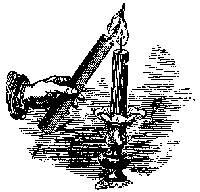 there are candles enough and to spare! There is no mystery about it -- the candles are not lighted; and until they are lighted they cannot remove our darkness. Grace is needed to make gifts available for the service of God.
there are candles enough and to spare! There is no mystery about it -- the candles are not lighted; and until they are lighted they cannot remove our darkness. Grace is needed to make gifts available for the service of God.
Let us look more closely into our collection of lights. Here is one which I should suppose to be an archbishop at the least. This specimen is a Doctor of Divinity. These are gentry, and these are merchants, and those are "cultured" individuals; but without the light from on high they are all equally unserviceable. A poor converted lad in a workshop will be of more spiritual use than a parliament of unregenerate men. I introduce to you a lighted rushlight, and there is more to be seen by this ignoble luminary than by all the rest. Little ability, set on fire by the life of God, may produce greater results than ten talents without the divine power. "A living dog is better than a dead lion": a zealous but illiterate Christian may be worth twenty lifeless philosophers.
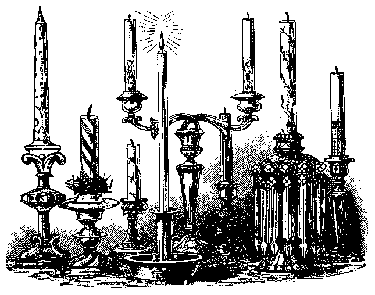 Herein is great encouragement, dear friends, that if you once get a light, it will spread from one to another without end. This one lighted candle would suffice to set a hundred candles shining. It may light a much finer candle than itself. Fire is one of those things for which there is no accounting as to what may come of it. Its spread is not to be measured
Herein is great encouragement, dear friends, that if you once get a light, it will spread from one to another without end. This one lighted candle would suffice to set a hundred candles shining. It may light a much finer candle than itself. Fire is one of those things for which there is no accounting as to what may come of it. Its spread is not to be measured
 even by leagues when it once gets firm hold, and the wind drives it on. Piety in a cottage may enlighten a nation. If the church of God were reduced to one person, it might, within an incredibly short time, become a great multitude.
even by leagues when it once gets firm hold, and the wind drives it on. Piety in a cottage may enlighten a nation. If the church of God were reduced to one person, it might, within an incredibly short time, become a great multitude.
There is a true apostolical succession in the kingdom of grace. Office has the pretence of it, but grace gives the reality. At Mr. Jay's Jubilee, Timothy East, of Birmingham, told how, by the youthful ministry of William Jay, a thoughtless youth was converted and became a minister. Under the preaching of that man, Timothy East himself was led to repentance, mid then by a sermon from Timothy East, John Williams, who became the martyr of Erromanga and the apostle of the South Sea Islands, was savingly impressed. See how the light goes from Jay to another, from that other to East, from East to Williams, and from Williams to the savages of the Southern Seas!
A family treo of an equally interesting character has been traced with regard to books as surely as with living witnesses for God. A Puritan tract, old and torn, was lent by a poor man to Baxter's father. It was called Bunny's Resolutions. Through reading this little book, Richard Baxter, afterwards the great preacher of Kidderminster, received a real change of heart. Baxter wrote The Saint's Everlasting Rest, which was blessed to the conversion of Doddridge. He wrote The Rise and Progress, which was the means of the conversion of Legh Richmond: and he wrote his Dairyman's Daughter, which has been translated into more than fifty languages, and has led to the conversion of thousands of souls. How many of these converted ones have in their turn written books and tracts which have charmed others to Jesus, eternity alone will reveal. We can never see the issues of our acts. We may strike a match, and from that little flame a street may be lighted. Give a light to your next door neighbour, and you may be faking the nearest way to instruct the twentieth century, or to send the gospel to Chinese Tartary, or to overthrow the popular science fetish of the hour. A spark from your kitchen candle may, in its natural progression from one to another, light the last generation of men; so the word of the hour may be the light of the age, by which men may come in multitudes to see their Saviour and Lord. Let thy light shine, and what will come of it thou shalt see hereafter.
Coming one Thursday in the late autumn from an engagement beyond Dulwich, my way lay up to the top of the Herne Hill ridge. I came along the level out of which rises the steep hill I had to ascend. While I was on the lower ground, riding in a hansom cab, I saw a light before me, and when I came near the hill, I marked that light gradually go up the hill, leaving a train of stars behind it. This line of new-born stars remained in the form of one lamp, and then another, and anotller. It reached from the foot of the hill to its summit. I did not see the lamplighter. I do not know his name, nor his age, nor his residence; but I saw the lights which he had kindled, and these remained when he himself had gone his way. As I rode along I thought to myself, "How earnestly do I wish that my life may be spent in lighting one soul after another with the
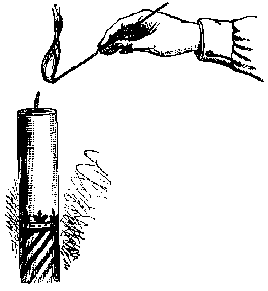 sacred flame of eternal life! I would myself be as much as possible unseen while at my work, and would vanish into the eternal brilliance above when my work is done." Will you, my brother, begin to light up some soul to-night? Speak of Jesus to some person who knows him not. Who can tell, but you may save a soul from death? Then carry the flame to another, and to another. Mark the years of your life by your continual diligence in spreading "the light of the knowledge of the glory of God in the face of Jesus Christ?"
sacred flame of eternal life! I would myself be as much as possible unseen while at my work, and would vanish into the eternal brilliance above when my work is done." Will you, my brother, begin to light up some soul to-night? Speak of Jesus to some person who knows him not. Who can tell, but you may save a soul from death? Then carry the flame to another, and to another. Mark the years of your life by your continual diligence in spreading "the light of the knowledge of the glory of God in the face of Jesus Christ?"
The taper which I hold in my hand is in itself a poor thing as an illuminator, but it has created quite a splendour in the room by the light which it has communicated to others. Andrew was not a very great personage, but he called his brother Peter, and led him to Jesus, and Peter was a host in himself. Never mind how small a taper you may be; burn on, shine at your best, and God bless you. You may lead on to grand results despite your feebleness. He that called Dr. John Owen is forgotten: I might almost say was never known: he was a small taper -- but what a candle he lighted! Those holy women who talked together as they sat in the sun at Bedford were a blessing to John Bunyan; but we know not the name of even one of them. Everywhere the hiddcn ones are used of the Lord as the means of lighting up those who shine as stars in the churches.
In the service of God we find the greatest expansion of our being. It makes the dead man speak, and it also makes a single living man spread himself over a province. Our forefathers were fond of riddles. I cannot say that they were very witty ones, but there was solidity in them. Here is one -- What is that of which twenty could be put into a tankard, and yet one would fill a barn? Twenty candles unlighted would scarce fill a jug; but one when it is lighted will beneficially fill a barn with light, or viciously fill it with fire and smoke. A man, what is he? A man of God, what is he not? 0ur influence may enlighten the world and shine far down the ages, if the Holy Spirit's fire shall kindle us.
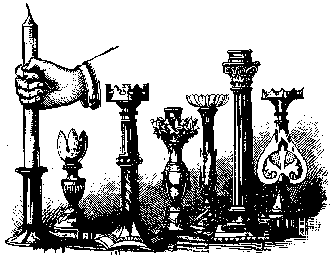 Here is a candle which has never given any light yet, and never will as it now is. Hear its reason for not giving light! It is so unfortunate that it cannot find a proper candlestick, in which to stand upright and fulfil the purpose for which it was made. Let us try to accommodate it. Here is a fine church candlestick, and we set our candle in the socket. Does it shine? No. Shall we try a lower plaee? It does not shine any better, We will put this candle in the most enviable position -- in this real silver eandlestick, of the most elaborate workmanship. It does not shine one whit the more. Neither high nor low places will make a man what he is not.
Here is a candle which has never given any light yet, and never will as it now is. Hear its reason for not giving light! It is so unfortunate that it cannot find a proper candlestick, in which to stand upright and fulfil the purpose for which it was made. Let us try to accommodate it. Here is a fine church candlestick, and we set our candle in the socket. Does it shine? No. Shall we try a lower plaee? It does not shine any better, We will put this candle in the most enviable position -- in this real silver eandlestick, of the most elaborate workmanship. It does not shine one whit the more. Neither high nor low places will make a man what he is not.
I know persons who cannot get on anywhere; but, according to their own belief, the fault is not in themselves, but in their surroundings. I could sketch you a brother who is unable to do any good because all the churches are so faulty. He was once with us, but he came to know us too well, and grew disgusted with our dogmatism and want of taste. He went to the Independents who have so much more culture, breadth, and liberality. He grew weary of what he called "cold dignity." He wanted more fire, and therefore favoured the Methodists with his patronage. Alas! he did not find them the flaming zealots he had supposed them to be: he very soon outgrew both them and their doctrines, and joined our most excellent friends, the Presbyterians. These proved to be by far too high and dry for him, and he became rather sweet upon the Swedenborgians, and would have joined them had not his wife led him among the Episcopalians. Here he might have enjoyed the otium cum dignitate; have taken it easy with admirable propriety; and have even grown into a churchwarden; but he was not content; and before long I heard that he was an Exclusive Brother! There I leave him, hoping that he may be better in his new line than he has ever been in the old ones. "The course of nature could no further go": if he has not fallen among a loving, united people now, where will he find them? Yet I expect, that as Adam left Paradise, so will he ultimately fall from his high estate. He reminds me of a very good man who changed his religious views so often, that I once asked him, "What are you now?" He told me, and I went on my way; but when I met him next, and made the same inquiry, he was something else. At our next meeting my reverend brother was grieved because I said to him the third time, "What are you now?" He reproved me for it; but when I somewhat impenitently repeated the query, and pressed it home, I found that he really had entered another denomination since I had last seen him. What a pity that the churches should be so bad, that when a man has gone the complete round he finds none which quite comes up to his mark! If some of these brethren go on their way to heaven alone, they will increase the heaven below of those who are not forced to put up with them.
The same illustration suggests to me to ask you whether you know the young man who cannot serve God as an apprentice, but is going to do wonders when he is out of his time? Yes, he only wants to be put into another candlestick. So he thinks: but we know better. When he is out of his time, and has become a journeyman, he will postpone his grand plans of usefulness till he has started as a master on his own account. Alas! when he is a master, he will wait till he has made money and can retire from business. So, you see, the candle does not shine, but it imputes its failure to the candlesticks! The candlesticks are not to be blamed.
Poor Dick Miss-the-Mark believes that he ought to have been Oliver Cromwell; but as that character is hardly in season in this year of grace, Richard is unable to be Cromwell, and therefore he is not himself at all. That wart over the eye, and other Cromwellian distinctions, are a dead loss in his case. He cannot develop his genius for want of a King Charles and a Prince Rupert. The proper candlestick is not forthcoming, and so this fine candle cannot shine.
This is a very simple affair -- Field's Self-fitting Candle; but it is very handy. You see, owing to the shape of its lower end,
 the candle will fit into any candlestick, whether it be large or small. A man of this sort makes himself useful anywhere. In poverty he is content; in wealth he is humble. Put him in a village, and he instructs the ignorant; place him in a city, he seeks the fallen. If he can preach, he will do so; and if that is beyond his capacity, he will teach in the Sabbath-school. Like the holy missionary Brainerd, if he cannot convert a tribe, he will, even on his dying bed, be willing to teach a poor child his letters. It is a great thing not only to be able to fit in to all kinds of work, but to cope with all sorts of people. The power of adaptation to high and low, learned and ignorant, sad and frivolous, is no mean gift. If, like Nelson, we can lay our vessel side by side with the enemy, and come to close quarters without delay, we shall do couslderable execution. Commend me to the man who can avail himself of any conversation, and any topie, to drive home saving truth upon the conscience and heart. He who can ride a well-trained horse, properly saddled, does well; but the fellow who can leap upon the wild horse of the prairie, and ride him bare-backed, is a genius indeed. "All things to all men", rightly interpreted, is a motto worthy of the great apostle of the Gentiles, and of all who, like him, would win souls for Jesus.
the candle will fit into any candlestick, whether it be large or small. A man of this sort makes himself useful anywhere. In poverty he is content; in wealth he is humble. Put him in a village, and he instructs the ignorant; place him in a city, he seeks the fallen. If he can preach, he will do so; and if that is beyond his capacity, he will teach in the Sabbath-school. Like the holy missionary Brainerd, if he cannot convert a tribe, he will, even on his dying bed, be willing to teach a poor child his letters. It is a great thing not only to be able to fit in to all kinds of work, but to cope with all sorts of people. The power of adaptation to high and low, learned and ignorant, sad and frivolous, is no mean gift. If, like Nelson, we can lay our vessel side by side with the enemy, and come to close quarters without delay, we shall do couslderable execution. Commend me to the man who can avail himself of any conversation, and any topie, to drive home saving truth upon the conscience and heart. He who can ride a well-trained horse, properly saddled, does well; but the fellow who can leap upon the wild horse of the prairie, and ride him bare-backed, is a genius indeed. "All things to all men", rightly interpreted, is a motto worthy of the great apostle of the Gentiles, and of all who, like him, would win souls for Jesus.
It is a pity when a man is too big for his position -- as some candles are too big to fit in certain candlesticks. Don't I know some Jacks-in-office who are a world too great to be of the slightest use to anybody? Don't ask them a question unless you desire to be eaten up alive. On the other hand, it is not pretty to see a candle with paper round it to keep it in its place; nor is it nice to see a little man padded out to make him fill up an important office. Some men in prominent positions are like the small boy on the high horse; they need a deal of holding on. Be fit for your office, or find one for which you are fit. It is not a very great invention to make a candle self-fitting, but the result is very pleasant. Though the expression, "the right man in the right place", is said to be a tautology, I like it, and I like best of all to see it in actual life. Try to fit yourself to whatever comes in your way.
Hearty service, rendered from pure motives, is acceptable to God, even when persons of education and taste have just cause to find fault with its imperfections. If we cannot bear witness for the gospel in grammatical language, we may be thankful that we can do it at all, and we may be encouraged by the unquestionable fact that God blesses the most unpolished utterances.
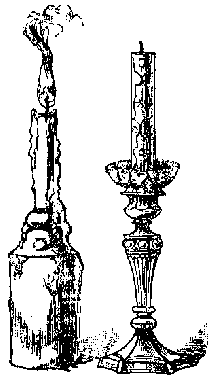 When you go to do a bit of carpentering in the shed, and need a light, you are sometimes on the look-out for the means of setting up your bit of candle in a handy way. Here is the great invention in which your researches usually end. You see I have stuck a candle into a ginger-beer bottle, and the light which comes from it is quite as clear as if I had a fine plated candlestick. Here is a popular implement, and it is both handy and cheap. Who would find any fault with it if he were in the dark, and wanted to find something in a hurry? If you have no fitter candlestick, a ginger-beer bottle does mightily well. How often our Lord has used men of scanty education, or of none at all! How useful he has made the things which are despised! Yet, at the same time, if it were left to me to make my choice as to how I would have my candle set up, I should not object to have it in a more presentable stand. I would not quarrel even if the candle given to me to go to bed with were in a silver candlestick. For use I would sooner have a ginger-beer bottle with a bright candle in it than a plated candlestick with a dead candle in it which I could not light. Who would object to be rid of the guttering and the hot dropping tallow, and to handle a concern which would not dirty his hands? A thing of beauty and of brightness is a joy for ever. Grace shines none the less because the person and his speech are graceful. The world, with its Board Schools, is getting more and more educated, and the rage for ginger-beer-bottle lights is not so great as it was. We have now passed beyond the age in which vulgarity and power were supposed to be nearly related. As there is no sin, that I know of, in grammatical language and good taste, I hope we shall never set a fictitious value upon coarseness, nor go out of our way to marry godliness with slang. Our Lord and his cause should be served with our best. Even our best is not of itself worthy of his glory; but at least let us not give to him the offal and the refuse of human speech. Young man, blaze away; but you need not be coarse. Bring us a light, but use a decent candlestick if you can.
When you go to do a bit of carpentering in the shed, and need a light, you are sometimes on the look-out for the means of setting up your bit of candle in a handy way. Here is the great invention in which your researches usually end. You see I have stuck a candle into a ginger-beer bottle, and the light which comes from it is quite as clear as if I had a fine plated candlestick. Here is a popular implement, and it is both handy and cheap. Who would find any fault with it if he were in the dark, and wanted to find something in a hurry? If you have no fitter candlestick, a ginger-beer bottle does mightily well. How often our Lord has used men of scanty education, or of none at all! How useful he has made the things which are despised! Yet, at the same time, if it were left to me to make my choice as to how I would have my candle set up, I should not object to have it in a more presentable stand. I would not quarrel even if the candle given to me to go to bed with were in a silver candlestick. For use I would sooner have a ginger-beer bottle with a bright candle in it than a plated candlestick with a dead candle in it which I could not light. Who would object to be rid of the guttering and the hot dropping tallow, and to handle a concern which would not dirty his hands? A thing of beauty and of brightness is a joy for ever. Grace shines none the less because the person and his speech are graceful. The world, with its Board Schools, is getting more and more educated, and the rage for ginger-beer-bottle lights is not so great as it was. We have now passed beyond the age in which vulgarity and power were supposed to be nearly related. As there is no sin, that I know of, in grammatical language and good taste, I hope we shall never set a fictitious value upon coarseness, nor go out of our way to marry godliness with slang. Our Lord and his cause should be served with our best. Even our best is not of itself worthy of his glory; but at least let us not give to him the offal and the refuse of human speech. Young man, blaze away; but you need not be coarse. Bring us a light, but use a decent candlestick if you can.